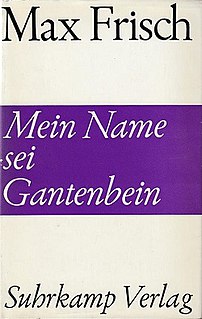 W
WAtemwende,, is a 1967 German-language poetry collection by Paul Celan.
 W
WCrossing the Sierra de Gredos is a 2002 novel by the Austrian writer Peter Handke. It tells the story of a successful female banker who makes a journey through the Sierra de Gredos mountain range in Spain to meet a famous author in La Mancha who will write her biography. On the way she makes stops where she is confronted with the unheroic and commercialised world she wishes to escape.
 W
WErklärte Nacht is a 2002 poetry collection by the German writer Durs Grünbein.
 W
WGantenbein is a 1964 novel by the Swiss writer Max Frisch. Its original German title is Mein Name sei Gantenbein, which roughly means "Let's assume my name is Gantenbein." It was translated into English in 1965 by Michael Bullock as A Wilderness of Mirrors. The novel features an anonymous narrator who tells a multitude of fictional stories, which together reveal certain traits and patterns.
 W
WThe Goalie's Anxiety at the Penalty Kick is a 1970 short novel by the Austrian Nobel prize winning writer Peter Handke. It was adapted into a 1972 film with the same title, directed by Wim Wenders.
 W
WLegitimation Crisis is a 1973 book by the philosopher Jürgen Habermas. It was published in English in 1975 by Beacon Press, translated and with an introduction by Thomas McCarthy. It was originally published by Suhrkamp. The title refers to a decline in the confidence of administrative functions, institutions, or leadership: a legitimation crisis.
 W
WMalina is a 1971 novel by the Austrian writer Ingeborg Bachmann. It tells the story of a female writer and her relationships with two different men, one joyous and one introverted. The book was adapted into a 1991 film with the same title, directed by Werner Schroeter from a screenplay by Elfriede Jelinek.
 W
WA Moment of True Feeling is a 1975 novel by the Austrian writer Peter Handke.
 W
WThe Moravian Night is a 2008 novel by the Austrian writer Peter Handke. It tells the story of a retired writer who talks about a recent journey and the state of Europe in front of a small crowd on his houseboat, while anchored outside the village Porodin on the river Morava in Serbia.
 W
WMy Year in the No-Man's-Bay is a 1994 novel by the Austrian writer Peter Handke. It follows a writer's attempt to describe a metamorphosis he went through two decades earlier, when he stopped being confrontative and instead became a passive observer. The task proves to be difficult and most of the book is instead concerned with the lives of the narrator, his family and the people in the Paris suburb where he lives. The book is 1066 pages long in its original German. It was published in English in 1998, translated by Krishna Winston.
 W
WOld Masters: A Comedy is a novel by the Austrian writer Thomas Bernhard, first published in 1985. It tells of the life and opinions of Reger, a 'musical philosopher', through the voice of his acquaintance Atzbacher, a 'private academic'.
 W
WRage and Time: A Psychopolitical Investigation is a 2006 book by the German philosopher Peter Sloterdijk. It traces the role and prevalence of rage in Western history, starting with the Thumos described by Homer in the Iliad. Sloterdijk argues that a productive form of rage has been suppressed by first Christianity and then psychoanalysis.
 W
WRepetition is a 1986 novel by the Austrian writer Peter Handke. It tells the story of an Austrian of mixed German and Slovenian heritage, who goes to communist Yugoslavia in a search for identity.
 W
WShort Letter, Long Farewell is a 1972 novel by the Austrian writer Peter Handke. It tells the story of a young Austrian writer who travels across the United States in search of his wife from whom he is estranged. The film-director John Ford appears as a character who brings resolution at the end of the road on the coast of California. His film Young Mr. Lincoln also serves as a point of reference and an antidote to the alienation experienced by the stranger crossing the States. The novel shares many themes and motifs with the film Alice in the Cities from 1974, directed by Handke's frequent collaborator Wim Wenders; the film can be seen as a response to the book.
 W
WStorm Still is a 2010 play by the Austrian writer Peter Handke. The narrator, with traces of Handke himself, looks back at the National Socialist era, when one Slovenian family in Carinthia collaborates with the Germans, while another opposes them.
 W
WWoodcutters is a novel by Thomas Bernhard, originally published in German in 1984. A roman à clef, its subject is the theatre and it forms the second part of a trilogy, between The Loser (1983) and Old Masters (1985) which deal with music and painting respectively. An English translation by David McLintock was published as Woodcutters in 1987; another English translation by Ewald Osers was published in 1988 under the title Cutting Timber: An Irritation. Its publication created an uproar in Austria, where became a bestseller before a defamation lawsuit by the composer Gerhard Lampersberg resulted in a court order to pulp the remaining copies; Lampersberg, a former friend of Bernhard's, subsequently dropped the suit.